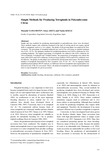Simple Methods for Producing Tetraploids in Polyembryonic Citrus
JARQ : Japan Agricultural Research Quarterly
| ISSN | 00213551 |
|---|---|
| 書誌レコードID(総合目録DB) | AA0068709X |

本文フルテキスト
jarq58-2_113-119.pdf1.18 MB
Simple and easy methods for producing autotetraploids in polyembryonic citrus were developed. These methods require only colchicine treatment at the time of sowing and do not require special skills or equipment, such as in vitro culture. The ploidy of all growing plants was analyzed by flow cytometry. The percentage of tetraploid induction per seed in five accessions at optimal treatment was 11.0% - 42.5%. The optimum condition for tetraploid production was 0.005% colchicine for 24 h, excluding Kabuchii. The highest percentage of tetraploids was induced with 0.01% colchicine for 24 h in Kabuchii. In Kabuchii and ‘Yoshida Ponkan,’ the proportions of tetraploids were almost the same with 0.005% and 0.01% colchicine. In all accessions studied, 0.002% and 0.02% colchicine were not effective. The ploidy of some plants was confirmed by chromosome observation. The chromosome numbers of tetraploids determined by flow cytometry were 36 (2n = 4x = 36). In sequence-related amplified polymorphism (SRAP) analysis, no difference between tetraploids and original plants was detected in any of the five accessions. Hence, all analyzed tetraploids are considered autotetraploids (true-to-type tetraploids of a given accession).
| 刊行年月日 | |
|---|---|
| 作成者 | Masashi YAMAMOTO Seiya ARITA Naoko KOZAI |
| 著者キーワード | breeding chromosome colchicine flow cytometry polyploid |
| 公開者 | Japan International Research Center for Agricultural Sciences |
| 受付日 | 2023-05-15 |
| 受理日 | 2023-08-21 |
| オンライン掲載日 | |
| 巻 | 58 |
| 号 | 2 |
| 開始ページ | 113 |
| 終了ページ | 119 |
| DOI | 10.6090/jarq.58.113 |
| 言語 | eng |
